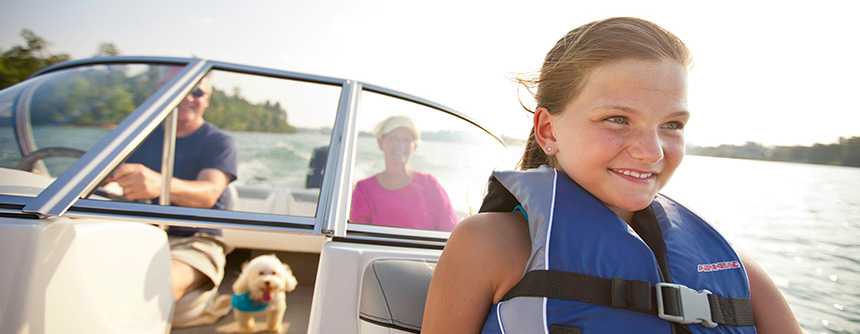For those born and raised, or just always on the water, bringing the entire family on the boat is second nature. However, even the most experienced boating families need to practice safe habits on the water. Many of these safety tips go without saying, but it’s always beneficial to have a refresher.
Lifejackets are a must
Teaching kids about the importance of wearing a lifejacket is a critical part of boat safety. We teach them to wear a helmet when riding a bike and to wear your seatbelt when riding in the car, and that same approach applies for wearing a lifejacket on the boat. Younger kids tend to wander off or get easily distracted, so lifejackets should be worn even while on the dock. Tweens will likely tell you they’re “too cool” to wear a lifejacket, but even strong swimmers need to wear one on smaller boats and jet skis or while being towed.

Like other aspects of parenting, leading by example is important. If your kids, grandkids, nieces, nephews, or even neighbors see you wearing a lifejacket then they may want to, too.
If the thought of putting your kids in a lifejacket feels as daunting as making them put on sunscreen, try spinning it into a game. Turning what feels like a chore into a fun new activity can help keep fussing to a minimum.
When choosing a lifejacket, make sure the weight classification listed on the lifejacket matches up with your child’s weight, not just their age. For a list of lifejackets approved by the US Coast Guard, check out Boater Kids. Because the law can vary from state to state, Florida boaters should review the Florida Fish and Wildlife Conservation Commission’s Boating Safety & Education information.
Childproof the helm and cabin
It always helps to have multiple adults onboard: one for running the boat and one or more for handling the kiddy crew. Think of them as First Mates who don’t get paid enough!
Even with extra sets of eyes onboard, curiosity can get the best of little ones. Secure locks on cockpit and cabin doors with straps that snap over the latch. Prevent little fingers from reaching for flashy lights and buttons by snapping on a helm cover whenever the helm is unattended.
Any precautions you would take in your home should also be taken on your boat. This includes covering electric outlets and keeping cleaning products and fishing gear locked up or out of reach. Much like parenting, boating with each child is different but gets easier with each experience you have.
Keep kids comfy and busy
When the kids are entertained, they’re less likely to go looking for trouble—that means true relaxation can begin! After they’ve worn themselves out from splashing in the water, pull out some boating-related children’s books or a good old game of I Spy. Even sitting on your lap while watching the Captain drive can be a new and exciting experience itself.
Taking a cat nap in the shade after a nutritious lunch and lots of fluids can prevent kids and adults from getting cranky after a long day. The gentle rocking of the ocean will put most babies to sleep. If you’re unsure whether baby will get seasick, it’s best to have medicine on board just in case.
A lifetime of safety
“Start ‘em while they’re young” is a great approach to instilling boating safety. Making safety a positive experience for kids at an early age makes them more likely to keep these habits for the rest of their lives—just like the fond memories you’ll create on the water.

